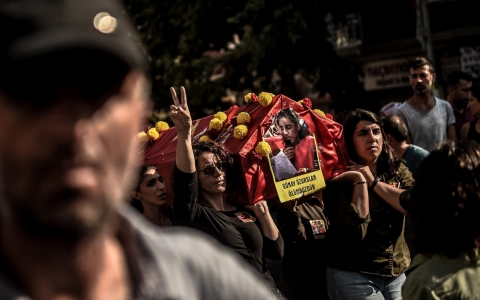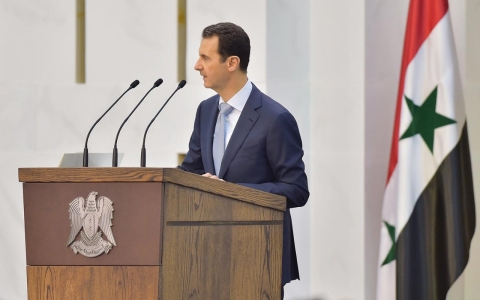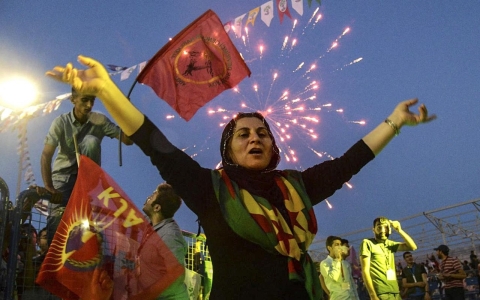Turkey on Tuesday launched its heaviest assault on Kurdish fighters in northern Iraq since commencing its airstrike campaign against them last week. The overnight assault started shortly after President Recep Tayyip Erdogan said the Turkish-Kurdish peace process has become impossible.
The strikes hit six Kurdistan Workers' Party (PKK) targets, including shelters and arms depots near the group's mountainous stronghold in Qandil, according to a statement from Prime Minister Ahmet Davutoglu's office.
Ankara launched nearly simultaneous strikes against the PKK in Iraq and ISIL in Syria last Friday, in what Davutoglu has called a "synchronized fight against terrorism."
A NATO member, Turkey opened up its air bases to the U.S.-led coalition battling the Islamic State in Iraq and the Levant (ISIL), joining the front line in the battle against the armed group after years of reluctance. NATO gave Turkey its full political support on Tuesday.
But Turkey's assaults on the PKK have so far been far heavier than its strikes against ISIL, fueling suspicion that its real agenda is keeping Kurdish political and territorial ambitions in check, something the government denies.
Ankara has made clear that its operations against ISIL in Syria will not include air cover for Syrian Kurdish fighters also battling the group.
The chairman of Turkey's pro-Kurdish opposition HDP party, Selahattin Demirtas, whose lawmakers Erdogan wants to see prosecuted for alleged links to the PKK, called for an immediate halt to violence on both sides.
"We have to establish democratic pressure that will help silence the guns immediately. We are ready to work with all politicians who want to achieve this," he told reporters.
Turkish officials have said the strikes against the PKK are a response to increased violence in recent weeks, including a series of targeted killings of Turkish police officers and soldiers blamed on the Kurdish fighters.
On Tuesday fighter jets also bombed PKK targets in the southeastern Turkish province of Sirnak, bordering Iraq, after an attack on police.
The PKK has characterized the Turkish strikes as an attempt to crush the Kurdish political movement and create an authoritarian, hegemonic system in Turkey. But it has so far stopped short of explicitly pulling out of a peace process with the state.
Erdogan initiated negotiations in 2012 to try to end the PKK’s fight for an autonomous state. The fighting has been largely fought in the predominantly Kurdish southeast and has killed 40,000 people since 1984. A fragile cease-fire had been in place since March 2013.
While Western allies have said they recognize Turkey's right to self-defense, they have urged it not to allow years of peace efforts with the PKK to collapse. The United States deems the PKK a terrorist organization, but it depends heavily on allied Kurdish fighters battling ISIL in Syria.
On Tuesday, Erdogan urged parliament to strip politicians with links to the PKK of immunity from prosecution — a move seen as aimed squarely at the HDP. On Wednesday, Turkey’s parliament was due to discuss the military operations in Iraq and Syria as well as Erdogan's call for the lifting of immunity.
Deputy Prime Minister Yalcin Akdogan, who has overseen the Turkish government’s efforts to settle its conflict with the PKK, accused the HDP of sacrificing the process in the name of political ambition. He said the group was more interested in winning enough votes to enter parliament than in working to resolve the conflict.
The HDP won 13 percent of the vote in a June 7 election, helping deprive Erdogan’s Justice and Development Party (AKP) of a majority in parliament for the first time since 2002 and forcing it to seek a junior coalition partner or face fresh elections.
"The HDP has destroyed the trust, has betrayed the peace process," Akdogan told the state-run Anadolu news agency. But he stopped short of declaring it definitively over. "It is unclear how the process will continue. First the PKK should put down weapons. If there's anything to be discussed, we can discuss it after that."
Many Kurds believe that by reviving the conflict with the PKK, Erdogan seeks to undermine support for the HDP before possible new elections. He has made no secret of his desire to change the constitution and amass stronger powers — which would be virtually impossible without a strong single-party AKP government.
The AKP has been holding coalition talks, but the leader of the largest opposition party, the CHP, said last week that he saw early elections as the most likely outcome.
"The president does not want a coalition to be formed. He knows that if a coalition is formed, whatever remains from his executive presidency dream will completely be destroyed," said Idris Baluken, a senior HDP lawmaker.
Al Jazeera and Reuters

Analysis: Turkey’s intervention against ISIL may be providing cover for a parallel campaign against the PKK

Analysis: With rebels gaining ground, Syria’s president signals new strategy to defend key coastal cities

Pro-Kurdish HDP won historic 13 percent of vote in elections by attracting broad spectrum of minority voters






Error
Sorry, your comment was not saved due to a technical problem. Please try again later or using a different browser.